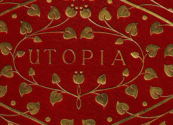Utopian Thought in George Eliot’s Middlemarch
by Elissa Myers
I am interested in the concept of utopia as a restrictive environment in which in order to achieve a certain ideal of perfection, the standards of a few are effectively mandated and difference is therefore suffocated. I think this idea could be usefully applied to the concept of the home that is visible in George Eliot’s novel, Middlemarch.
My analysis of Middlemarch would center on the home that Tertius Lydgate , a promising young doctor and a stranger to town, and Rosamond Vincy, his materialistic, naive wife, build together.
Their home can be considered a utopia in that though both Rosamond and Lydgate aim high in their choice of each other as sexually and socially desirable mates and their attempts to achieve a higher class status than they have at the novel’s beginning, their individual utopian impulses are contradictory, precluding their chance of sustaining a happy home. Rosamond’s tenaciously espoused idea that “the good life” is obtained through membership in a certain class causes her to spend much of Lydgate’s meager salary on rich furnishings for their home and to disapprove of his (to her mind) undignified position as a doctor. Lydgate’s marriage thus makes impossible both his pride, as he is forced to beg his friends for money to support Rosamond’s lifestyle, and his professional ambition, as he is forced to become a gout doctor to make more money, abandoning the more idealistic work he previously did with the poor.
This central conflict between the two–the impossibility of Rosamond’s being happy as a woman of status, while Lydgate remains happy as a doctor to the poor–stems significantly from their gendered socialization, and the fact that that socialization seemed to aim primarily at upward mobility. Rosamond has been inculcated with a desire for upward mobility from a young age, believing that nothing but the best quality household goods and clothing will “answer.” Furthermore, as a woman, she understands marriage as, to a large extent, to be about the establishment of the home, and the beautiful, highly-valued things with which it is adorned.
On the other hand, Lydgate has been taught from a young age to value the surface-level beauty (which Rosamond has in spades) as the best quality in a woman. He has also been taught to value marks of status as enabling him to establish a reputation among his clients, and thus, to continue to be an effective breadwinner for his family. It is this duty to his gendered role as breadwinner that causes him to take on Rosamond’s excessive requirements for happiness as his responsibility. Therefore, Rosamond and Lydgate’s happiness is made impossible by idealized, yet narrow conceptions of the ideal home as a gendered space rich in material comforts.
I would also like to look at the material objects in their home, such as Rosamond’s copy of the popular periodical, the Keepsake Annual, as well as the couple’s piano in order to see if such objects reinforce the utopian aspects of the home. Perhaps in the instance of the Keepsake, women are depicted in very normative ways? And the piano certainly reinforces the home as a gendered space, as women are usually the ones requested to play and sing at parties.
To complicate this idea, I would also like to look at the relationships of Will Lladislaw and Dorothea Brooke, and Mary Garth and Fred Vincy, who end up much happier than the Lydgates. I think examining their relationships will illustrate that Eliot thinks happy homes are created through both much less narrow gender expectations, and lifestyles in which money is not used to mindlessly acquire material goods, but is instead distributed to the poor, or used to make investments that yield simple joys over time (i.e. farm animals, which give milk, eggs, and the satisfaction of hard work).
Though I have read one essay discussing the economics of Middlemarch, I think my analysis would be uniquely pertinent to the field of Victorian Studies, as it presents an interpretation more grounded in material history–an approach which, though it is very popular, to my knowledge, has not been taken before with regard to this novel. Ideally, I would like to say that Eliot owes a literal debt to the genre of utopia–that perhaps she read Thomas More or (even more likely) that she read Gulliver’s Travels in her studies (which are known for being much more in-depth and philosophical than what most women were allowed to pursue). I would then try to find evidence in her letters, which I believe are easily accessible, that she might have seen some similarities between Middlemarch and famous utopian narratives, or that her philosophy might at least have been affected by utopian though. I think this would also present something new to the study of this very important novel, as I have never seen Eliot’s and More’s (or Swift’s) names linked.
My goal with this paper is to try to mesh the concept of utopia with a classic of Victorian literature in order to produce something unique (but pertinent) that I can present at a Victorian conference or publish in a Victorian journal. My biggest anxiety, however, is that this audience might not understand my rationale for meshing these two topics. To that end, it would be very useful if y’all could give me feedback on how convincing this proposal is, and/or suggestions as to how to make the connection between the fields of Utopian Studies and Victorian Studies more visible to readers.


